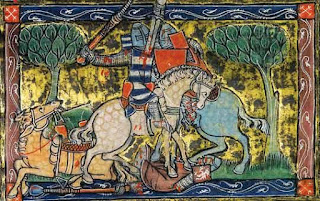 |
| The Death of King Arthur by John Mulcaster Carrick |
The Arthurian Cycle is a wonderful compilation of stories around the main figure of King Arthur and it's a must in the universal literature, especially Middle Age one. The Arthurian Cycle is a masterpiece from the point of view of Literature but it's also a masterpiece in Philosophy and History. The thoughts of King Arthur cross over cultures and languages and they become in ethical and moral guides in our 21st century because his knowledge is timeless and eternal.
The Grandma has also studied two new lessons of her Intermediate Language Practice manual (Vocabulary 1 & 2).
More information: Word Formation 1
Le Morte d'Arthur, originally spelled Le Morte Darthur, Middle French for The death of Arthur, is a reworking of existing tales by Sir Thomas Malory about the legendary King Arthur, Guinevere, Lancelot, Merlin, and the Knights of the Round Table. Malory interpreted existing French and English stories about these figures and adds original material.
Malory's actual title for the work was The Whole Book of King Arthur and His Noble Knights of the Round Table, but after Malory's death the publisher changed the title to what is commonly known today. The Death of King Arthur originally only referred to the final volume in the complete work.
 |
| The Death of King Arthur |
Le Morte d'Arthur was first published in 1485 by William Caxton and is today one of the best-known works of Arthurian literature in English. Until the discovery of the Winchester Manuscript in 1934, the 1485 edition was considered the earliest known text of Le Morte d'Arthur and that closest to Malory's translation and compilation. Various modern editions are inevitably variable, changing a variety of spelling, grammar, and/or pronouns for the convenience of readers of modern English. Many modern Arthurian writers have used Malory as their principal source.
Sir Thomas Malory retold the story of Arthur's birth, his conquests, his friendship with Merlin, and his death. To this day, Malory's work is considered by many to be the most authoritative telling of the Arthurian Legend. Malory titled his work Le Morte d'Arthur. Translated into English, this means The Death of King Arthur.
More information: All Art
Arthur immediately began pursuit of Lancelot and Guinevere, and they were quickly found at Lancelot's castle in Wales. For months, Arthur and his men laid siege to it. Finally, an agreement was reached whereby Guinevere was returned to Arthur, and Lancelot was sent to France in exile.
But Arthur was still angry. Lancelot had betrayed him, and he wanted revenge. He followed Lancelot into France, leaving Mordred in charge. Then Arthur received the news he dreaded worst: in his absence, Mordred had declared himself King, and had taken Guinevere as his queen. Now, Arthur had no choice but to return to Camelot to defend his kingdom.
 |
| Lancelot and Guinevere at King Arthur's tomb |
In a dream, Arthur was warned not to fight Mordred right away, so he sent messengers into his camp to try and negotiate. During their talks, one of Mordred's men was bitten by an adder.
As he drew his sword to kill it, the sun glinted off his blade. Both armies mistook this as a sign that someone had drawn his sword to fight, and a great battle began. The battle raged on all day, and by nightfall, it was down to every last man to fight. In the commotion, Arthur had dropped Excalibur and its scabbard. Seeing Mordred, he picked up a spear, and charged at him. Mordred charged back with his sword. The sword came forward and cleaved Arthur's skull just as he drove his spear through his son's hateful heart.
As he drew his sword to kill it, the sun glinted off his blade. Both armies mistook this as a sign that someone had drawn his sword to fight, and a great battle began. The battle raged on all day, and by nightfall, it was down to every last man to fight. In the commotion, Arthur had dropped Excalibur and its scabbard. Seeing Mordred, he picked up a spear, and charged at him. Mordred charged back with his sword. The sword came forward and cleaved Arthur's skull just as he drove his spear through his son's hateful heart.
More information: The Medieval World
As Arthur lay dying, his last request was that the sword Excalibur and the scabbard be thrown back into the lake from whence they came.
Out of the mists of the lake, three Fairy Queens appeared. They placed Arthur's body on a barge, and sailed off with him to the mystical island of Avalon to cure him of his wounds. And some say he still lays there, sleeping in a hollow hill, and that he will awaken one day to defend Britain, when Britain has need of him.
I found Him in the shining of the stars,
I marked Him in the flowering of His fields,
But in His ways with men I find Him not.
I waged His wars, and now I pass and die.
Idylls of the King (1856–1885) by Alfred, Lord Tennyson, The Passing of Arthur
I marked Him in the flowering of His fields,
But in His ways with men I find Him not.
I waged His wars, and now I pass and die.
Idylls of the King (1856–1885) by Alfred, Lord Tennyson, The Passing of Arthur
No comments:
Post a Comment